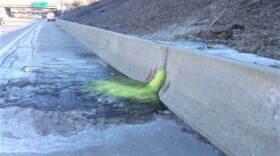The U.S. Environmental Protection Agency finished the second phase of a new method for chemical pollution cleanup at a Superfund site in St. Louis, Michigan.
This site is 52 acres where the Velsicol Chemical plant once stood. It manufactured DDT, polybrominated biphenyls (PBBs), and chlorobenzene among other toxic chemicals.
It’s located along the Pine River. The contamination forced St. Louis to get its water from another source. (See Michigan Radio's past coverage of the Velsicol Superfund site here.)
The new cleanup method at the site is called thermal treatment. It heats up groundwater and the chemicals in it to the boiling point and captures the vapor.
Tom Alcamo is the EPA’s project manager for the Velsicol cleanup. He notes that water by itself weighs about eight pounds a gallon.
“The contaminants we're recovering weigh over 17 pounds a gallon. And so these materials are a dense, heavily contaminated material. And it continues to provide a source for groundwater contamination. So in the long run, this will help with the groundwater treatment system that will have to be put in place in the future,” Alcamo said.
This is the second phase of the thermal treatment project. It captured 180,000 pounds of contaminants. In the first phase, 56,000 pounds of the pollutants were retrieved. This fall, preparation for a third phase of the thermal treatment will begin.
After that phase is complete, the EPA will starting pumping water out of the ground and strip the chemicals out. It’s commonly called “pump and treat.” That cleanup will take many more years.
So far, more than $200 million dollars in federal and state tax dollars have been spent to cleanup pollution from the bankrupt chemical company’s plant site.
Want to support reporting like this? Consider making a gift to Michigan Radio today.






